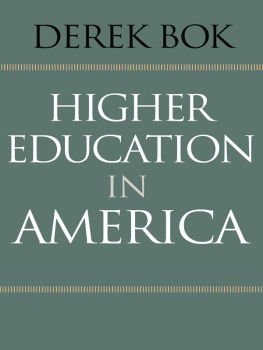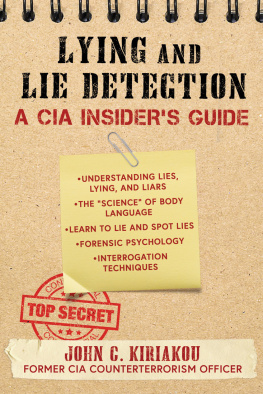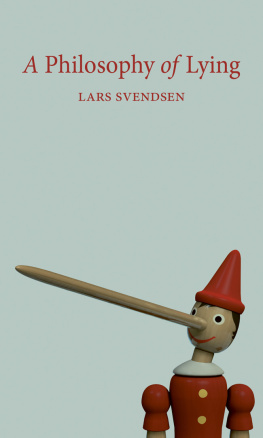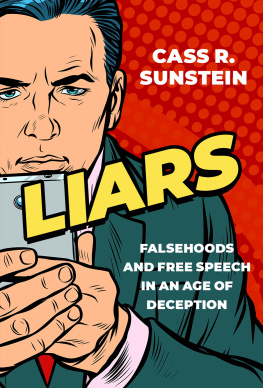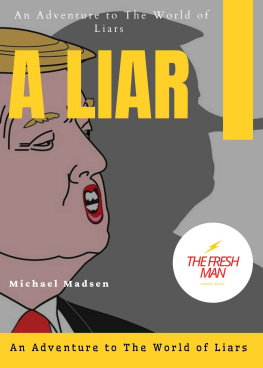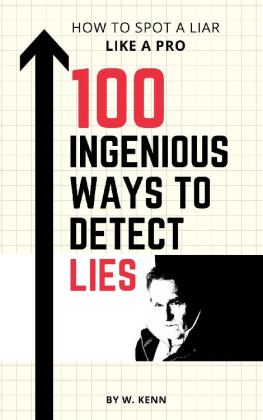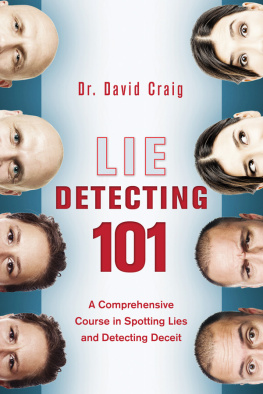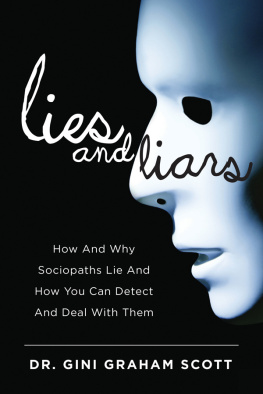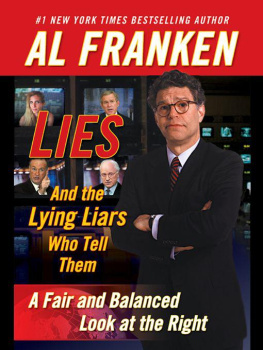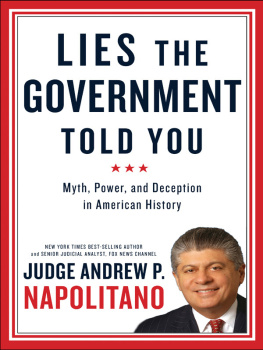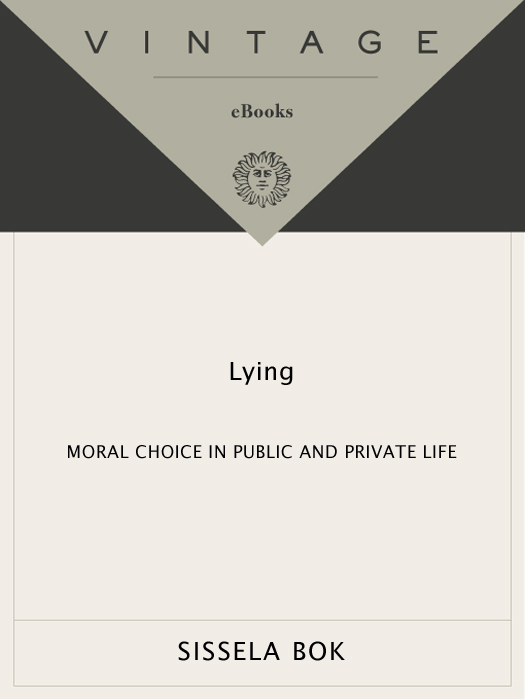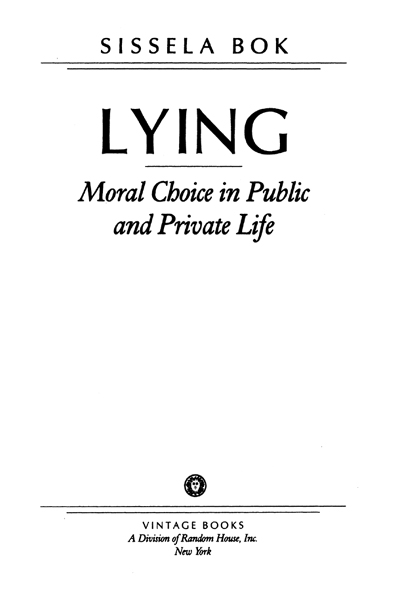ALSO BY SISSELA BOK
Secrets: On the Ethics of Concealment and Revelation
A Strategy for Peace:
Human Values and the Threat of War
Alva Myrdal: A Daughters Memoir
Common Values
Mayhem: Violence as Public Entertainment
Euthanasia and Physician-Assisted Suicide
(with Gerald Dworkin and R. G. Frey)
EDITED BY SISSELA BOK
The Dilemmas of Euthanasia
(with John Behnke)
Ethics Teaching in Higher Education
(with Daniel Callahan)
VINTAGE BOOKS EDITION , December 1989
SECOND VINTAGE BOOKS EDITION , August 1999
Copyright 1978, 1989, 1999 by Sissela Bok
All rights reserved under International and Pan-American Copyright Conventions. Published in the United States by Vintage Books, a division of Random House, Inc., New York, and in Canada by Random House of Canada Limited, Toronto. Originally published by Pantheon Books, a division of Random House, Inc., in May 1978, and subsequently updated by Vintage Books, New York, in 1989 and 1999.
Library of Congress Cataloging in Publication Data
Bok, Sissela. Lying.
1. Truthfulness and falsehood. I. Title.
BJ1421.B64 1979 177.3 78-21949
eISBN: 978-0-307-78911-2
Since this copyright page cannot accommodate all acknowledgments, they have been placed on the following pages.
v3.1
Grateful acknowledgment is made to the following for permission to reprint previously published material:
Lewis White Beck: Excerpt from On a Supposed Right to Lie from Altruistic Motives in The Critique of Practical Reason and Other Writings in Moral Philosophy by Immanuel Kant, ed. and trans. by Lewis White Beck.
Basil Blackwell, Publisher: Excerpt from Utilitarianism Revised by R. F. Harrod. Reprinted from Mind 45 (1936): 13756.
The Bobbs-Merrill Co., Inc.: Excerpt from On the Law of War and Peace by Hugo Grotius, trans. by Francis W. Kelsey.
Burns & Oates: Excerpt from Summa Theologica 2, 2, ques. 110, art. 2, by Thomas Aquinas, literally trans. by the Fathers of the English Dominican Province. Copyright Burns & Oates 1953, 1977.
The Catholic University of America Press: Excerpts from Lying and Against Lying in Treatises on Various Subjects, vols. 14, 16, by St. Augustine, ed. by R. J. Deferrari, in Fathers of the Church series.
Harvard University Press: Excerpt from The Poems of Emily Dickinson, ed. by Thomas H. Johnson. Reprinted by permission of the publishers and the Trustees of Amherst College. Copyright 1951, 1955 by the President and Fellows of Harvard College.
Alfred A. Knopf, Inc.: Excerpt from Three Plays by Jean-Paul Sartre. Copyright 1948, 1949 by Alfred A. Knopf, Inc. Reprinted by permission of Alfred A. Knopf, Inc.
MacMillan & Co., London: Excerpt from Classification of DutiesVeracity in The Method of Ethics, 7th ed., by H. Sidgwick.
Macmillan Publishing Co. and SCM Press: Excerpt from What Is Meant by Telling the Truth? by Dietrich Bonhoeffer in Ethics, ed. by Eberhard Berthge. Copyright 1955 by Macmillan Publishing Co. Inc. SCM Press, Ltd., 1955
Methuen & Co. Ltd.: Excerpt from The Object of Morality by G. J. Warnock.
Ward, Lock, Ltd.: Excerpt from Of Truth in Essays Civil and Moral by Francis Bacon.
For Derek
CONTENTS
ACKNOWLEDGMENTS
I am happy to thank those many friends who shared with me the thoughts that the subject of lying inevitably brings to mind; and to thank especially those who read all or part of the manuscript: Graham Allison, Barbara Barss, John Blum, Hilary Bok, Harold Bursztajn, Ann Cohen, Burton Dreben, Neva and Walter Kaiser, Margaret Kiskadden, Melvin Levine, Alva Myrdal, Bertha Neustadt, John Noonan, Jr., Brita Stendahl, Judith Thomson, and Ruth and Lloyd Weinreb. Their criticisms meant a great deal at every stage of writing; if I did not always take their advice, I alone am to blame.
My gratitude goes also to John Coakley and Deborah Narcini for locating and translating theological texts; and to Deborah Lipman for most expert assistance in preparing the manuscript. I thank James Peck, moreover, for his most welcome help in editing this book.
Finally, I dedicate this book to my husband, in recognition of all that his interest, criticism, and support have meant.
PREFACE TO THE 1989 EDITION
Over ten years have passed since this book was first published, in 1978. During that period, the issues of truthfulness and deceit have received considerable debate. I can no longer subscribe, therefore, to the claim I made in the Introduction, that those issues have received extraordinarily little contemporary analysis. Questions of truthfulness and deception are now taken up in classrooms as in the media and in scholarly literature. Codes of ethics, such as the 1980 Principles of Medical Ethics of the American Medical Association, have incorporated clauses stressing honesty.
More than debate, however, will be needed to press for changes in actual practices of lying, especially as those most tempted to engage in such practices find it easiest to ignore all hard questions about what they are doing. New examples have come to supplement those of Watergate and Vietnam and others mentioned in this book. In Wall Street investment firms, as among TV evangelists, in political campaigns, and in the interlocking schemes of the Iran-Contra scandal, we have seen how pervasive the resulting damage can be to those who lie, equivocate, and resort to innuendo as well as to their dupes. We have also seen the erosion of public trust as lies build up into vast institutional practices.
Rather than undating Lying to take these new developments into account, I have chosen to consider many of them in two books published in the intervening years: Secrets: On the Ethics ofConcealment and Revelation (1982) and A Strategy for Peace: Human Values and the Threat of War (1989). In the first, I could do so while pursuing issues, such as that of self-deception and secrecy, that I had explicitly set aside in writing Lying in order to be able to concentrate on clear-cut lies. And in the second, I have incorporated constraints on lying and on excessive secrecy, into a moral framework that can be shared by religious and secular traditions alike, and that is applicable both within and between nations.
Sissela Bok
June 1989
PREFACE TO THE 1999 EDITION
In preparing a new edition of this book, I have had cause to reflect on the admonition that we should take care in our youth when we choose our ambitions, for in our later years we may achieve them. My introduction, in 1978, had concluded with the hope that I might invite others to take up the debate about the practical moral choices concerning lying and truthfulness that we all confront. Two decades later, the airwaves resonate with accusations of lying and with disputes concerning every variant of prevarication, evasion, outright lying, and perjury. In recent years, television screens have shown a parade of public officials, bankers, lawyers, union leaders, and business executives caught lying about bribery, insider trading, money laundering, and vast interlocking schemes of corruption. Exposs have proliferated about fraud in scientific research and Medicare, entrapment by undercover police and reporters, and hoaxes in book publishing and psychotherapy.



